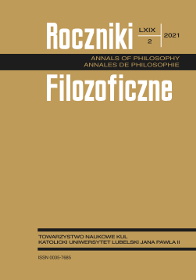The Model of the Multipartite Soul as the Antic Horizon of the Question of the Human Will in the Light of the Nicomachean Ethics 1111b and the Republic 437B – 440D
Abstract
An analysis of the concept of resolution (προαίρεσις) and rational desire (βούλησις) in the third book of the Nicomachean Ethics 1111B leads Aristotle to discuss the problem of weakness of will (ἀκρασία) in the context of the relationship between reason, lust and anger. The philosophical source of the possibility of such a discussion is most likely the text of the fourth book of Politea, in which Plato founded the theory of the multipartite soul, thus making it possible to answer the question about the sources of motivation for human action that are different from reason. Thus, Plato resolves the aporia of Socratic intellectualism, in the light of which the reason responsible for human motivations is in contradiction to the phenomena of action devoid of the features of rationality and self-control. The juxtaposition of the text of Nicomachean Ethics 111B and Politea 437B–440D opens the horizon of the question about the possibility of the Platonic genesis of human volitional acts and, in the longer term, also the concept of human will. The fruit of this juxtaposition is an attempt to interpret the Platonic theory of the soul in the light of the Aristotelian concept of ὄρεξις, by means of which the Stagirite distinguishes three elements of the soul analogous to Platonic reason, lust and anger (λογισμός — ἐπιθυμία — βμολς), such as rational desire, θυμοειδές — ἐπιθυμητικόν). The perception of the possibility of the Platonic genesis of volitional acts defined later by Augustine in the context of the concept of the will (voluntas) is based on the finding of a relationship between rational desire interpreted by Aristotle as a volitional act (βούλησις) and Plato’s interpretation of reason not only as an intellect, but also as a dynamics that appears on the one hand in the form of erotic power (Symposium, Phaedrus) and on the other hand in the form of rational desire (Hippias Minor, Gorgias).
References
Arystoteles. 2002. Dzieła wszystkie. T. 5 [Etyka nikomachejska. Etyka wielka. Etyka eudemejska. O cnotach i wadach]. Warszawa: Wydawnictwo Naukowe PWN.
Arystoteles. 2003. Dzieła wszystkie. T. 3 [O duszy. Krótkie rozprawy psychologiczno-biologiczne. Zoologia. O częściach zwierząt]. Warszawa: Wydawnictwo Naukowe PWN.
Augustyn. 2001. O wolnej woli. Tłum. Anna Trombala. W: Tenże. Dialogi filozoficzne, 493-649. Kraków: Znak. (De libero arbitrio, red. W.M. Green, K.D. Daur, Corpus Christianorum Series Latina 29. Turnhout: Brepols, 1970).
Bizoń, Michał. 2015. „Powstawanie pojęcia woli u Platona: boulesthai, boulesis i airesis w Hippiaszu Mniejszym”. Kwartalnik Filozoficzny 43, z. 2: 41-73.
Bizoń, Michał. 2017. „Metateoria historii woli. Rozważania o powstaniu i współczesnym rozwoju pojęcia woli od V wieku przed Chrystusem do Maksyma Wyznawcy”. Roczniki Filozoficzne 65, nr 3: 31-51.
Bobzien, Susanne. 1998. „The Inadvertent Conception and Late Birth of Free-Will Problem”. Phronesis 43, no. 2: 133–175.
Bobzien, Susanne. 2002. Freedom and Determinism in Stoic Philosophy. Oxford: Clarendon Press.
Chamberlain, Charles. 1984. „The Meaning of Prohairesis in Aristotle’s Ethics”. Transactions of the American Philological Association 114: 147–157
Cicero, Marcus Tullius. 1918. Tusculanae disputationes, wyd. Max Pohlenz. Leipzig: Teubner Verlag.
Cooper, John M. 1984 „Plato’s Theory of Human Motivation”. History of Philosophy Quarterly 1: 3–21.
Cornford, F[rancis] M[acdonald]. „The Doctrine of Eros in Plato’s Symposium”. W: The Unwritten Philosophy and other Essays, red. W[illiam] K[eith] C[hambers] Guthrie, Cambridge: Cambridge University Press, 1950, 68-80.
Cyceron. 1961. Rozmowy tuskulańskie. W: Pisma filozoficzne. T. 3. Tłum. Józef Śmigaj, 475–743. Warszawa: PWN.
Dihle, Albrecht. 1982. The Theory of the Will in Classical Antiquity. Berkeley: University of California Press.
Dobbin, Robert. 1991. „Prohairesis in Epictetus”. Ancient Philosophy 11: 111-135.
Doroszewski, Witold (red.). 1950-1969. Słownik Języka Polskiego. T. 6 [1966]. Warszawa: PWN.
Gauthier, René Antoine. 1979. Aristote: l’éthique à Nicomaque. Louvain: Peeters.
Gordon, Jill. 2012. Plato’s Erotic World: From Cosmic Origins to Human Death. New York: Cambridge University Press.
Irwin, Terence H. 1977. Plato’s Moral Theory of Motivation, Oxford: Clarendon Press, 1977.
Irwin, Terence H. 1980. „Reason and Responsibility in Aristotle”. W: Essays in Aristotle’s Ethics, red. Amélie Oksenberg Rorty, 117–155. Berkeley: University of California Press.
Kahn, Charles. 1987. „Plato’s Theory of Desire”. The Review of Metaphysics 41, no. 1: 77–103.
Kahn, Charles. 1989 „Discovering the Will: From Aristotle to Augustine”. W: The Questions of ‘Eclecticism’: Studies in Later Greek Philosophy, red. Julie M. Dillon, 234–259. Berkeley: University of California Press.
Kenny, Anthony. 1979. Aristotle’s Theory of the Will. New Haven: Yale University Press.
Markus, R.A. 1971. „The Dialectic of Eros in Plato’s Symposium”. W: A Collection of Critical Essays – Plato II, wyd. Gregory Vlastos, 132–143. Notre Dame: University of Notre Dame Press.
Penner, Terry. 1971. „Thought and Desire in Platon”. W: A Collection of Critical Essays – Plato II, wyd. Gregory Vlastos, 96-118. Notre Dame: University of Notre dame Press.
Plato. 1911. Politeia, wyd. Karl Friedrich Hermann. Leipzig: Teubner Verlag.
Platon. 1982. Uczta, Eutyfron, Obron Sokratesa, Kriton, Fedon. Tłum. Władysław Witwicki. Warszawa: PWN.
Platon. 2004. Protagoras. Tłum. Leopold Regner. Warszawa: Wydawnictwo Naukowe PWN.
Platon. 2003. Państwo. Tłum. Władysław Witwicki. Kęty: Antyk.
Ryle, Gilbert. 2009. The Concept of Mind. London: Routlege.
Scott, Gary Allan, i William A. Welton. 2007. Erotic Wisdom. Philosophy and Intermediacy in Plato’s Symposium. Albany: State University of New York Press.
Sorabji, Richard. 1973-1974. „Aristotle on the Role of Intellect in Virtue”. Proceedings of the Aristotelian Society, New Series 74: 107–129.
Tomasz z Akwinu. 1980. Suma teologiczna. O człowieku (I, q. 75-84). T. 6. Tłum. Pius Bełch. Londyn: Veritas.
Tukidydes. 2003. Wojna pelopeneska. Tłum. Kazimierz Kumaniecki. Warszawa: Czytelnik.
Copyright (c) 2021 Roczniki Filozoficzne

This work is licensed under a Creative Commons Attribution-NonCommercial-NoDerivatives 4.0 International License.





